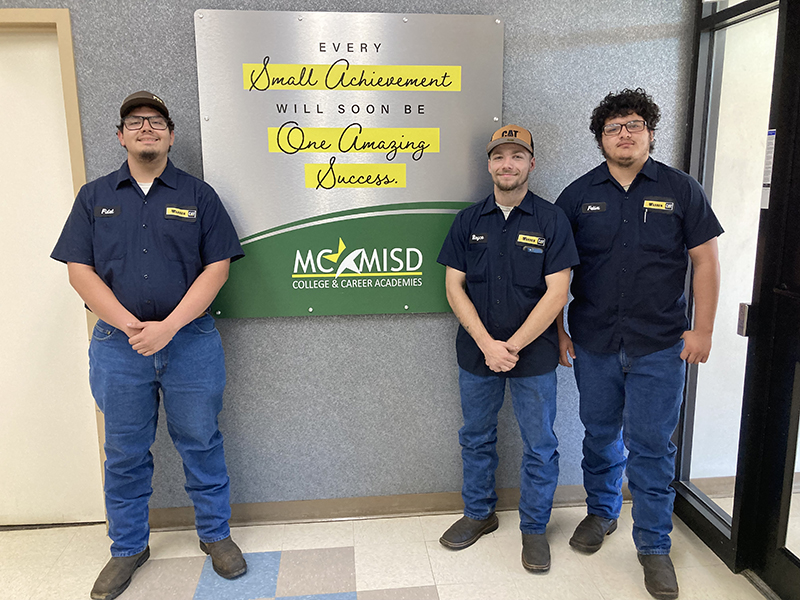 Felix Campos, Fidel Gardea de la Cruz and Royce Knight graduated from Midland High
School this past May, and they are already employed full-time at Warren CAT as diesel
tech trainees. Thanks to the Midland College (MC) dual credit Career & Technology
Education (CTE) program, they received certificates in Diesel Technology two weeks
before they graduated from high school and were immediately employable. Now, they
are continuing their studies to earn Associate of Applied Science degrees while working
full time at Warren CAT.
"The CTE dual credit program at Midland College is an incredible opportunity for students
to jumpstart their careers while still in high school,” Erick Gutierrez, MC program
chair of Automotive, Diesel & Energy Technology, said. “Through partnerships like
the one with Warren CAT, our students gain hands-on experience, professional mentorship
and financial support to pursue their education in high-demand fields like Diesel
Technology. This collaboration empowers students to enter the workforce with the skills
and confidence they need to succeed, creating a direct pathway from the classroom
to the industry. We’re excited to see the bright futures ahead for these talented
students!"
“Since we work fulltime, we take our Midland College classes online and at night,”
Campos explained. “It’s definitely worth it because once we have our associate degrees,
we will earn a higher salary and be even more in demand.”
Diesel technicians are needed in many industries, including manufacturing, construction,
facilities maintenance, aviation and, of course, the energy sector. The U.S. Bureau
of Labor Statistics projects that there will be about 25,600 openings for diesel technicians
each year over the next decade. Currently, in Texas, there are 21,180 diesel technician
jobs with annual wages ranging from $40,000 to over $100,000.
According to the April 26, 2024 issue of Pulse Magazine, many young people are simply
not aware of the career opportunities available as diesel technicians. Additionally,
there's a shortage of vocational and technical training programs focused on diesel
engine technology, which limits the number of new professionals entering the field.
However, Midland College is helping to alleviate the shortage by offering a robust
Diesel Technology program, and both college and high school students are eligible
to reap the benefits.
High school students like Campos, Gardea de la Cruz and Knight are able to begin taking
courses as early as their ninth-grade year. By the time they are juniors in high school,
they take classes both at their high school campus and also at MC’s Diesel Technology
facility located on Florida Street, immediately east of the MC Cogdell Learning Center.
Companies like Warren CAT partner with the program to provide “Tech Talks” where company
representatives serve as guest lecturers and give demonstrations on the latest technology.
As part of Tech Talks, company reps spend the last few minutes of the lecture talking
about job opportunities and recruiting students.
“The Tech Talks are just one of the many positive things about Midland College’s Diesel
Technology program,” Campos said. “It’s a great learning environment where we have
access to the latest tools, and everything is hands-on. The instructors are also very
knowledgeable as all of them have worked in the diesel industry. The skills we are
learning help prepare us for our jobs at Warren.”
“We first discovered Warren CAT job opportunities at one of the Tech Talks,” Gardea
de la Cruz added. “It’s a great company with lots of benefits, including tuition reimbursement
for our coursework at Midland College.”
Knight agreed and explained that he currently works 6:00 am-4:00 pm, Monday through
Thursday, and 6:00 am-5:00 pm on Fridays.
“I’m working more than 40 hours each week, but the overtime pay is great,” he said.
“Getting off work at 4:00 allows me to have some time before night classes and gives
me time to get online coursework done.”
Gardea de la Cruz said he works 10 hour shifts Tuesday through Friday and some weekends.
Campos works 45 hours each week.
All three of these young men claimed that they made a great decision when choosing
Diesel Technology in high school, and they all have future goals. Campos and Knight
said that their goal is to continue employment at Warren CAT and work their way up
the career ladder to becoming field techs. Gardea de la Cruz envisions his future
either as a field tech or working on cargo ships, perhaps in international waters.
“I always wanted to be a mechanic, and I always wanted to work on diesel engines,”
Knight said. “There’s more components and more horsepower than gasoline-powered engines.
If I were giving advice to a young high school student, I would tell them to learn
a business trade early and learn as much as possible. Then shoot for the stars. Anything
is possible.”
|
